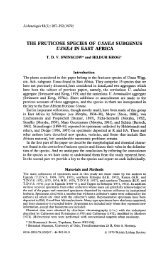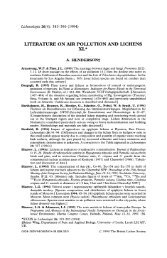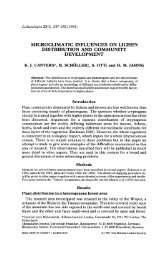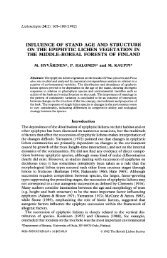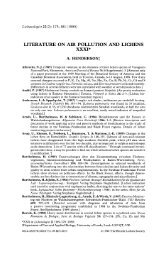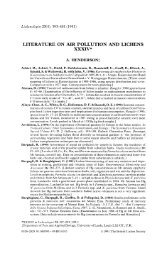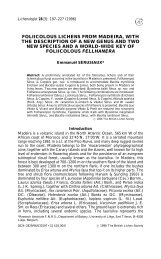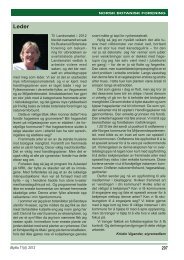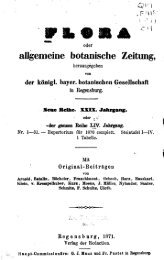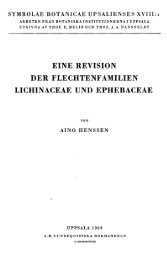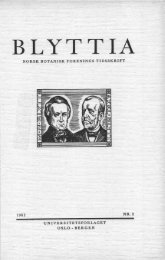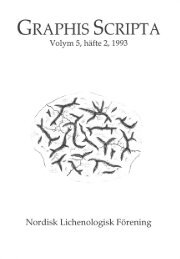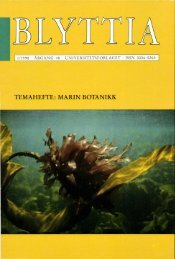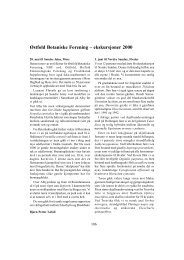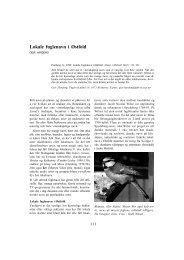British Museum (Natural History)
British Museum (Natural History)
British Museum (Natural History)
Create successful ePaper yourself
Turn your PDF publications into a flip-book with our unique Google optimized e-Paper software.
ERIK ACHARIUS AND HIS INFLUENCE ON ENGLISH LICHENOLOGY 163<br />
Because of difficulties in the passage of mail between Britain and Sweden, Dawson Turner did<br />
not receive Swartz's letter for eight months. Meanwhile he wrote to Swartz:<br />
'I must thank you for endeavouring to get me some lichens from Dr Acharius. I should be glad if you<br />
would ask that gentleman whether he ever received a letter I wrote him 3 or 4 years ago, and<br />
inclosed in a parcel from Dr Smith. I have often thought it unhandsome that he did not answer it,<br />
it never reached him<br />
but, from something I lately heard, I suspect .<br />
. . I am sorry I am not able to say<br />
anything about the opinions you were so good as to give me of the Lichens I sent, as I have not yet<br />
been able to get Dr Acharius' Dispositio. I believe there are but two copies in England, one Dr<br />
Smith has, which he will lend me as soon as I am ready to use it, another Mr Winch of Newcastle<br />
writes me that he has. I hope soon to receive from you a parcel of Lichens, for I am exceedingly fond<br />
of the genus; and I doubt not but by the time they arrive my bookseller will have procured me the<br />
work. Dr Smith is quite well; his third vol. will be published in a few days, after which he<br />
immediately applies to the Flora Graeca. Mr Lambert's splendid monograph of the Genus Pinus has<br />
appeared, but I have not yet seen it. I understand a coloured copy costs 40 guineas, which is a most<br />
absurd price. Sir Jos. Banks has been ill very with the gout, but I had a letter from him a few days<br />
since, in which he says he is better. He is going to adopt a milk diet, from which, if his constitution<br />
will support the change, he promises himself great benefit. I hope God will prolong a life, so<br />
interesting to all science, and to all the civilised world ... It would give me great oleasure to enter<br />
into a literary correspondence with Dr Acharius, which I would thank you to tell him, and give him<br />
my address. All is quiet in England, and at this time but little afraid of Invasion. Should the French<br />
come, they will find things more prepared to receive them than they expect.' (Turner, 18046).<br />
In May 1804 Turner wrote again to Swartz:<br />
'It is such an age since I had the pleasure of receiving a single line from you, that I cannot help<br />
feeling myself both surprized and vexed; nor can I avoid entertaining apprehensions lest some illness<br />
or unpleasant occurrence should have caused your unusual silence. I trust you have long since<br />
received a letter, which I wrote you on the 2nd February, and upon the proper arrival of which I<br />
should not entertain the least doubts, had I not by the same mail written to my friend, Mertens, from<br />
whom also I have yet received no answer. In case that letter miscarried, pray have the goodness to<br />
let me know; for it contained some information on the subject of Mosses, which I wish not to be lost,<br />
and which I would send again at some future opportunity: it thanked you too for your offer of<br />
introducing me to your friend, Dr Acharius, and said how happy I should be to enjoy the<br />
correspondence of so able a Botanist. From the unfortunate interruption to our communication with<br />
Germany, occasioned by the stoppage of the Elbe, his Methodus has not yet found its way to our<br />
English booksellers, nor have I had any opportunity of examining it, but Dr Smith, who went to<br />
London two days ago, has just sent me his copy to keep during his absence, so that I promise myself<br />
in a day or two a rich botanical treat . . . The<br />
first part of the Flora Graeca may now very soon be<br />
expected; and a new work, to be edited by Mr Konig who lives with Sir Joseph Banks, to be called<br />
Annals of Botany, and to appear quarterly: it will much resemble Dr Schrader's Journal . . . Can<br />
you favour me in your next letter with specimens of Lichen sylvaticus in fruit, sarmentosus with<br />
shields, arcticus, muricatus, and divergensl My desiderata from Acharius's Methodus are<br />
numberless, but I have many species which he has not included. I hope however, many weeks will<br />
not pass before I receive from you a large parcel of your Lichens, especially the crustaceous kinds. I<br />
mean to go to Wales in June, and then shall to be able to repay you.' (Turner, 1804c).<br />
Shortly afterwards, Swartz was able to assure Turner of Acharius's willingness to correspond<br />
with him:<br />
'Dr Acharius will also estimate himself happy of your acquaintance, and would have written long<br />
since if not a domestic calamity had befallen him, poor friend he lately lost him a kind wife! I now<br />
write to him to salute him on your part. He never got any letters from you. In the copy of his<br />
Methodus which you got from Dr Smith the I supplement suppose is still wanting. It was afterwards<br />
printed in Liepzig, and could accordingly not be sent at the same time. It contains mostly new<br />
species discovered by Wahlenberg.' (Swartz, 1804o).<br />
Acharius's Methodus and its reception in England 1804-1806<br />
At the time of publication of the Methodus, Smith and Turner were among the most active<br />
lichenologists in England and both, using Swartz as a catalyst, had established a correspondence



